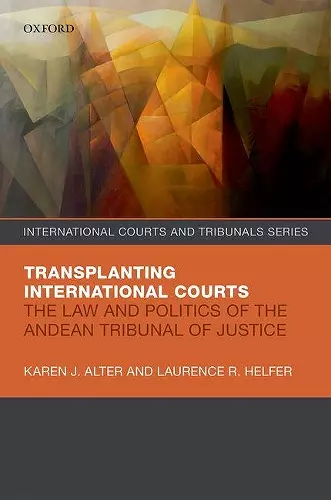Transplanting International Courts
The Law and Politics of the Andean Tribunal of Justice
Laurence R Helfer author Karen J Alter author
Format:Hardback
Publisher:Oxford University Press
Published:16th Mar '17
Currently unavailable, and unfortunately no date known when it will be back
This hardback is available in another edition too:
- Paperback£32.99(9780198838807)

Transplanting International Courts: The Law and Politics of the Andean Tribunal of Justice provides a deep, systematic investigation of the most active and successful transplant of the European Court of Justice. The Andean Tribunal is effective by any plausible definition of the term, but only in the domain of intellectual property law. Alter and Helfer explain how the Andean Tribunal established its legal authority within and beyond this intellectual property island, and how Andean judges have navigated moments of both transnational political consensus and political contestation over the goals and objectives of regional economic integration. By letting member states set the pace and scope of Andean integration, by condemning unequivocal violations of Andean rules, and by allowing for the coexistence of national legislation and supranational authority, the Tribunal has retained its fidelity to Andean law while building relationships with nationally-based administrative agencies, lawyers, and judges. Yet the Tribunals circumspect and formalist approach means that, unlike in Europe, community law is not an engine of integration. The Tribunals strategy has also limited its influence within the Andean legal system. The authors also revisit their own path-breaking scholarship on the effectiveness of international adjudication. Alter and Helfer argue that the European Court of Justice benefitted in underappreciated ways from the support of transnational jurist advocacy movements that are absent or poorly organized in the Andes and elsewhere in the world. The Andean Tribunals longevity despite these and other challenges offers guidance for international courts in other developing country contexts. Moreover, given that the Andean Community has weathered member state withdrawals and threats of exit, major economic and political crises, and the retrenchment of core policies such as the common external tariff, the Andean experience offers timely and important lessons for European international courts.
Whatever your interests in this field, whatever transnational system you may be researching or teaching, the rich insights of this book on how to think of such will upgrade your own analytical (and normative) toolkit. As a side benefit, it is very well written - a good read. * Joseph Weiler, EJIL: Talk!14/01/2020. *
Alter and Helfer's story of the Andean Tribunal reminds me of my own fascination with the European Court of Justice and the robustness with which since the 1960s it forged its doctrines of direct effect and supremacy of EC law onto the domestic legal systems of the leading Western European countries. A couple of decades later, the member states of the Andean Community transplanted the ECJs design features and doctrines into their region by creating the ATJ. Alter and Helfer tell us how this new-style international court, despite moving in a political and economic environment so different from that of its European role model, was able to establish for itself a distinct role. The authors are right in calling the ATJ the most successful example of an international court in a developing country context and they make their point in a clear, lively and superbly researched way. * Bruno Simma, former Judge at the International Court of Justice, Member of the Iran-US Claims Tribunal *
The European Union's integration through law experiment has generated many attempts to transplant it to other regions. The Andean Tribunal is the most successful of these attempts. It is one of the most active international judicial bodies, yet with a much more limited scope of cases than the European Court of Justice. In this book, Alter and Helfer, two leading scholars of judicial integration, explain the successes and pitfalls of judicial transplants. The authors' powerful and convincing analysis highlights why the Andean Tribunal may provide the best example to understand both the potential and the limits of international courts to promote regional integration. * Miguel Poiares Maduro, former Advocate General at the Court of Justice of the European Union *
Through their exploration of the law, politics, and history of the Andean Tribunal, Alter and Helfer unsettle and recast many accepted theories about how international courts construct their power. The tale of this bustling but little-known tribunal forces us to rethink what we thought we knew about international courts, most of it gained from the European experience. The book is a singular contribution to the study of Latin American politics. It challenges us to take seriously the role of international courts in shaping economic behavior at the domestic and transnational level. Read from this perspective, the book is poised to open a rich new line of socio-legal inquiry in Latin America and other developing regions. * Alexandra Huneeus, Associate Professor of Law, University of Wisconsin *
Transplanting International Courts - a must-read for anyone who works with international courts challenges many existing presumptions and rethinks existing models for understanding supranational adjudication. Alter and Helfer's comparative analysis of the Andean Tribunal of Justice across several decades of an evolving and volatile political landscape is particularly valuable for those engaged in promoting human rights in the Global South, who will be interested in the ATJ's insistence that economic integration also respect fundamental rights. A vital contribution to the under-researched topic of supranational bodies in the developing world, this book re-conceptualizes the operation of all international courts. * James Cavallaro, Commissioner and President, Inter-American Commission on Human Rights *
ISBN: 9780199680788
Dimensions: 240mm x 178mm x 28mm
Weight: 662g
334 pages